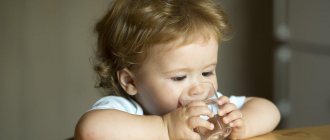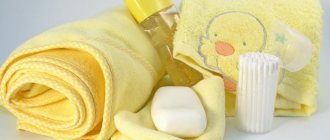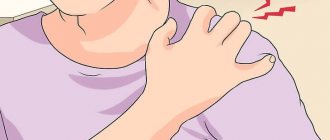Proper intimate hygiene for girls
From the moment a little princess appears in the family, it is necessary to understand that there are differences in the technology of washing a girl and a boy. Girls' intimate hygiene requires a little more attention and knowledge. So, girls are necessarily washed from front to back, and boys, vice versa.
Note!
In a newborn girl, vernix lubrication and particles of desquamated epithelium can often be seen between the labia. They need to be removed delicately using a soft, high-quality sponge.
Since every girl is a future mother, there are general rules:
- Before washing your baby, your hands should be clean;
- We use a pH-neutral baby product;
- do not allow detergent to penetrate into the vagina;
- We follow the “toothbrush rule”: the child must have his own separate towel and hygiene items;
- if any redness or inflammation appears, be sure to consult a pediatrician;
- Regardless of age, girls are recommended to wear underwear made from natural fabrics.
Hygiene of girls from birth to adolescence
Obstetrician-gynecologist, hospital № 6 Tatyana Anatolyevna Kislova
It is a great happiness when a girl appears in the family. She needs special care, since proper hygiene in the area of the external genitalia is very important, because in the future she will also become a mother.
In the meantime, you need to be able to properly care for her, wash her, and when she grows up, teach the girl to do everything on her own.
Features of hygiene of a newborn girl
A daughter was born, and many young mothers are wondering how to wash their baby. In the first month, you do not need to use any hygiene products, including baby soap - they disrupt the natural balance of the mucous membrane and can kill beneficial bacteria, thereby giving rise to the development of harmful microorganisms. After one month of age, you can use baby wash once a week during bathing, but soap should not be applied to mucous membranes, only to the skin.
How to properly wash a girl
You need to wash your baby after changing the diaper (but not necessarily after each, if the change occurs frequently) and after defecation.
The best option is warm running water from the tap. The stream of water should pour onto the pubic area, but not onto the labia. You need to wash in the direction from the pubis to the anus, but not vice versa, otherwise there is a high risk of infection.
After washing the child, wipe with blotting movements. There is no need to rush to put on a diaper - air baths are very beneficial for delicate skin. This is the prevention of pregnancy and hardening of the child. If it is not possible to wash the child, you can use wet wipes - the directions for wiping are the same.
Also, do not forget that the mother’s hands must be clean before washing or wiping.
An important issue is the girl's underwear. It should be 100% natural fabrics, and children's clothes should be washed strictly separately from adult clothes.
Hygiene of girls before puberty
From the age of two, a girl needs to be washed in the morning, in the evening and after defecation. Change panties 2-3 times a day, and from the age of six you can switch to 1 time a day.
It is very important that the mother begins to teach her daughter the rules of hygiene from about 4 years old - earlier it will be difficult for her, due to perception, to correctly perform all the techniques, although children are different and, perhaps, there are children who perceive their mother’s teaching well even at an earlier age .
You need to teach gradually, telling and explaining all the intricacies of the procedure. Explain that discharge may occur; if they are transparent and scanty, this is normal, but if the girl feels itching, sees a change in color, or the amount of discharge increases, she should always tell her mother about it. And then you need to go together to a pediatric gynecologist. And, of course, a mother should always be as attentive as possible to her daughter’s health
Age periods
Intimate hygiene for a girl up to one year old requires maximum attention with mandatory frequent washing. And although a newborn girl has to be washed up to 8 times a day, there is no need to be as fanatical as possible. It is enough to use baby products with a neutral pH during evening bathing. This way we will reduce the risk of dryness to a minimum.
In the period from 2 years to 8 years, a girl’s intimate hygiene gradually approaches what we are used to, and the acid-base balance shifts towards sour. If the need arises, it is allowed to use intimate hygiene products with a neutral pH, but not more often than once every 7-10 days. At the same time, until the onset of the prepubertal period (and even better, until the first menstruation), it is worth continuing to use cleansers for the little ones.
Intimate hygiene for teenage girls
During the period of hormonal changes in the body, personal hygiene requires special attention. During this period, vaginal discharge, called pubertal leucorrhoea, may appear. Their presence does not indicate a disease, but the normal natural development of the female body. However, accumulating on the external genitalia, leucorrhoea can provoke the onset of an inflammatory process. The body of a teenage girl is especially susceptible to infections during menstruation. Regular failure to comply with the rules of intimate hygiene in teenage girls during menstruation can lead to emergency medical care. To prevent this from happening, you must adhere to the following recommendations:
- Firstly, you need to wash yourself at least twice a day. During menstruation, you need to wash yourself a little more often, as needed. A hygienic shower is well suited for these purposes. Taking a bath on “critical days” is strictly prohibited.
- Secondly, do not forget about such an important thing as a towel (which, of course, must be individual). A waffle towel is not the best helper for these purposes. You need to remove water by blotting, but do not try to rub it, so as not to injure the delicate skin of the intimate areas.
- Thirdly, you need to change sanitary pads as often as possible and not try to save money by buying cheap pads. Remember that the stingy always pays twice: if there is no heavy discharge, then it is better to use pads with a natural cotton layer.
- Fourth, if possible, choose underwear made from natural materials.
- Fifthly, it is not recommended to use ordinary bar soap or shower gels for washing. With their frequent use, they can make the delicate skin of intimate areas dry, lead to itching of the skin, disruption of the pH of the microflora and unpleasant sensations.
Hygienic education of a girl as a future mother.
At birth, the girl’s genitals are still very “small”, but already require strict care. At an early age, the mother should take on this concern. How she takes care of her baby’s genitals determines whether her “baby” can, in turn, become a mother.Infants' skin is very delicate. The epidermis is vulnerable and any infection can create an inflammatory process. The same can be said about the lack of hygiene, in particular hygiene of the genital organs. Girls' genitals are vulnerable not only externally, but also internally. The genital mucosa in infants, which is usually designed to protect against infection, is still poorly developed.
In the first days after birth, girls may experience spotting. This is a normal process, since the girl still has her mother’s hormones, which are eliminated in this way. Therefore, there should be no panic. The discharge goes away in a couple of days. It is necessary to change disposable diapers every two hours and follow the rules of hygiene.
Washing procedure
Under no circumstances should you wash a girl’s genitals in a bathtub. It is better to wash the child with running boiled water. You can use damp cotton swabs for washing. The water procedure should be performed after each diaper change. While washing, the mother should move her hand from the pubis to the tailbone, in this direction. Otherwise, fecal residue may fall on the labia, and inflammation will begin.
In the first year of life, it is better not to use cosmetics to wash the genitals, and it is also better not to use potassium permanganate and other products. They dry out the skin and destroy the weak protective function of the skin that has already appeared. After a year, you can use special liquid soap for girls’ intimate hygiene and only if feces come into contact with the skin. Only the surface of the genital organs, that is, the large lips, is washed with soap. The soapy substance should not get into the genital crevice.
Dry the skin after washing with a separate towel that belongs only to the girl. In addition, she should have her own washcloth and soap. After this, you need to lubricate the outer part of the genitals with baby cream.
Underwear
Underwear should be made only from natural materials. For example, cotton or linen. Synthetic materials do not allow the skin to breathe. In addition, artificial fabric fibers cannot absorb the secretions that occur in girls, as a result they accumulate and rub the skin, causing inflammation.
The baby's clothes should always be loose: do not tighten the genital area or restrict movement. It is forbidden to wash a child’s clothes and underwear together with adults’ clothes.
Smegma
Many mothers begin to panic when they see that a girl has leucorrhoea. Although she hasn't even started her period yet. Be prepared that in the period from the first three to four months of life, from seven to nine and from thirteen to fourteen years, a white coating will form on the child’s labia. This does not indicate a disease at all, but that the genital organs are developing and maturing. Smegma is the result of the work of the sebaceous glands of the external genitalia. Remove white discharge with a swab dipped in boiled olive oil or boiled water. This is how you can act when the child is small. At an older age, the mother can tell the baby about these secretions and teach the child to independently care for the genitals.
By all of the above methods, namely hygiene of the genital area, we try to “escape” from many diseases. But mainly from vulvovaginitis. This is an inflammation of the female genitals, which is localized on the outer part of the genital organs. Most often, little girls under ten years of age suffer from vulvovaginitis. All due to the underdeveloped protective function of the body and poor hygiene. The disease develops and can lead to disastrous consequences, which are difficult to immediately determine. In the future, the girl may become infertile. Therefore, dear mothers, do not disdain the rules of hygiene. Then in the future there will be one more happy woman in the world!
Intimate hygiene products
From the moment of birth until the appearance of the first menstruation, it is better to choose liquid soap “from the first year of life.” For girls' intimate hygiene, this soap or gel is almost ideal. However, as we said above, you should not abuse it. If you don’t have the opportunity to wash yourself (for example, on long trips), you can use baby wipes.
Attention!
The use of adult sanitary napkins for these purposes is possible provided that they do not contain alcohol or antiseptics. Carefully read the recommendations and ingredients on the package!
In adolescence, you can already start using “EVO intimate” cosmetics for skin care for “tender areas”. They do not contain alkaline soap, and the composition is enriched with lactic acid, which is so necessary to maintain the required pH level in the body of a teenage girl. The delicate washing formula of liquid soap for intimate hygiene EVO and cream soap for intimate hygiene EVO and micellar gel EVO is enhanced with extracts of well-known and proven medicinal herbs and oils. The use of intimate hygiene products from the EVO series helps maintain the normal microflora of the mucous membrane and ensures the restoration of natural moisture with their regular use. They are safe, as they have undergone additional clinical trials and their hypoallergenicity has been confirmed by dermatologists.









